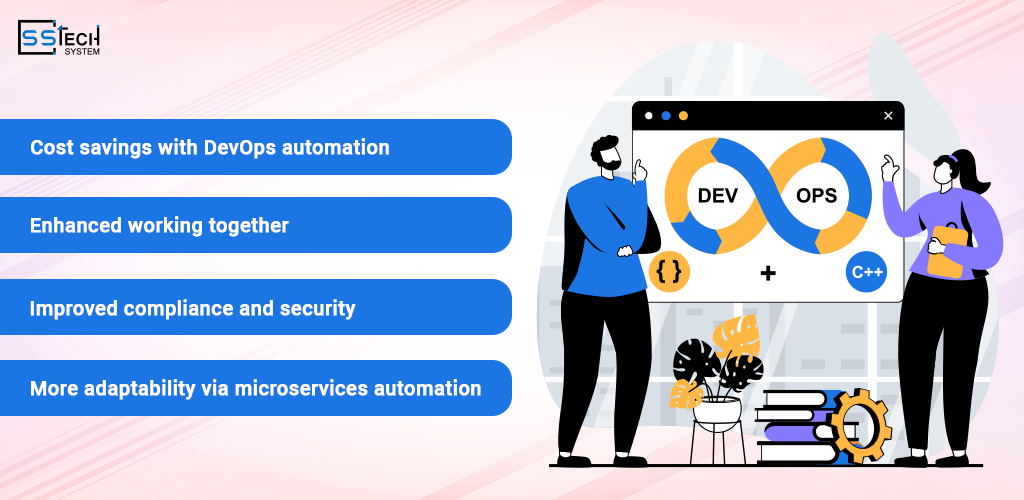
Companies in many fields are searching for methods to simplify their processes, increase effectiveness, and lower costs in the fast-paced digital terrain of today. Adopting DevOps automation is among the most successful ways to reach these objectives.
Using automation to manage repeating chores and free up essential resources, this technique maximizes the cooperation between development and operations teams. DevOps automation is transforming how businesses in Australia, India, and sectors like healthcare and e-commerce run. This article will discuss how DevOps Automation can significantly increase productivity and help companies save on expenses.
What is DevOps Automation?
DevOps automation uses many tools and technologies to handle repetitive chores during deployment and development automatically. This covers general tasks like testing, monitoring, configuration management, etc. Automating these chores helps companies lower human error, limit manual intervention, and guarantee quicker and more effective deployment cycles.
As software development becomes more complicated, DevOps Automation is becoming more important for companies. From sophisticated CI/CD (Continuous Integration/Continuous Delivery) pipelines to automated monitoring systems, automation helps operations teams and developers collaborate effortlessly, clearing bottlenecks and guaranteeing speedier releases.
How DevOps Automation Reduces Costs and Boosts Productivity
1. Reduced personal involvement
Reducing human involvement in repetitious operations is one of the main advantages of DevOps automation. Your team can concentrate on high-value activities such as feature development and issue fixes while automation handles chores, including testing, code integration, and deployment. In addition to accelerating the software development process, this reduces personnel expenses.
2. Lesser time to market
DevOps Automation lets companies, depending on regular releases or upgrades, move to market quicker. Time-to-market is crucial to maintaining competitiveness, whether your business is an expanding e-commerce platform or a software development company in Australia and India. Automated CI/CD pipelines provide considerably faster delivery of fresh features and upgrades and shorten deployment times.
3. Minimizing mistakes
Human mistakes are common in manual procedures, which may be expensive and time-consuming to fix. Errors in setup, testing, and deployment are much reduced by using DevOps Automation. Less downtimes, less botched deployments, and more consistent software releases follow from this.
4. Maximized resource allocation
Automating typical chores helps companies maximize their resource allocation. Smaller companies and startups significantly benefit from this, as resources are often limited.
Small firms using DevOps automation may undertake activities that usually call for more team members or consultants using automation technologies, enabling organizations to grow without commensurate manpower increase.
5. Automated surveillance systems
The deployment of automated monitoring systems is among the most essential features of DevOps Automation. These systems continuously monitor infrastructure and application performance, providing real-time data and alarms. Automating monitoring helps companies to swiftly find and fix problems before they become more serious, therefore lowering downtime and raising customer satisfaction.
Key Benefits of DevOps Automation

1. Cost savings with DevOps automation
The adoption of DevOps Automation is mainly motivated by cost-effectiveness. Businesses may save a lot of money by lowering physical labor, minimizing mistakes, and making the best use of resources. Focus these savings on marketing, innovation, or entering new markets.
In Australia, where companies may pay heavy labor expenses, the advantages of automation are even more clear-cut. Implementing DevOps Automation in Australia can help businesses have a competitive advantage and operate more effectively in a costly economy.
2. Enhanced working together
Collaboration between development and operations teams is underlined in DevOps Best Practices as vital. DevOps automation promotes this cooperation by giving both teams a consistent platform where they may work together effortlessly. Automated pipelines help to minimize misconceptions and miscommunication by ensuring that teams working in development and operations always agree.
3. More adaptability via microservices automation
One major development in DevOps Automation Trends is microservices automation. Businesses may use and update certain sections of their apps separately by separating programs into smaller, doable bits. This gives companies more agility and flexibility to react rapidly to shifting consumer wants or market demand.
4. Improved compliance and security
Security and compliance rank highest for businesses, including e-commerce and healthcare. DevOps Automation for E-commerce and Healthcare lets companies apply security rules and compliance checks automatically. This guarantees that your apps constantly comply with industry standards and lowers the risk of security breaches.
Top DevOps Automation Tools in Australia
DevOps Automation depends on selecting the correct instruments. These are some of the best DevOps Automation tools Australian companies use:
- Jenkins: An open-source CI/CD tool that automatically runs many phases of software development.
- Puppet: Puppet is a tool for automating configuration and infrastructure control.
- Docker: A popular containerizing tool, Docker automatically implements apps in isolated contexts.
- Kubernetes: Kubernetes is a technology for automatically managing, scaling, and deploying containerized applications.
- Ansible: Ansible is a free-source automation tool for application deployment, configuration management, and software provisioning.
Businesses throughout Australia and India extensively use these solutions, which provide scalability and adaptability for a range of sectors, including software development, e-commerce, and healthcare.
DevOps Automation with SSTech System
SSTech System is one of Australia’s top sources of DevOps automation services. Emphasizing tailored solutions, SSTech System Australia assists companies in automating their DevOps operations, thus guaranteeing quicker, more consistent software deliveries. SSTech System offers the knowledge and resources required for success, whether you need assistance with Microservices Automation, automated monitoring, or CI/CD pipeline deployment.
Using DevOps automation solutions, the SSTech System helps companies reach notable cost reductions, increase production, and improve general performance.
DevOps Automation Consulting Services
For companies just starting DevOps Automation, consultancy services may be beneficial. Providing complete DevOps Automation Consulting services, companies like SSTech System assist companies in evaluating their present systems, pinpointing areas for development, and applying automation plans. Whether your goal is to redesign your whole development pipeline or automate certain activities, a consulting partner may provide the direction and help required.
Conclusion
DevOps automation changes companies in a world where success depends on speed, efficiency, and cost-effectiveness. Companies may save time and money by automating repetitive operations, lowering mistakes, and enhancing teamwork—all of which help to raise the general quality of their software products.
Whether your company is a tiny business trying to grow or a big company trying to simplify your processes, DevOps Automation provides the tools and techniques required to thrive in today’s digital environment.
The need for specialist services and products will only keep rising as more companies in Australia and India adopt DevOps Automation. Leading this trend is SSTech System Australia, which offers customized solutions to enable companies to use automation fully. From cost reductions to higher productivity, DevOps Automation helps your company—now is the time to use these techniques and propel it forward.











